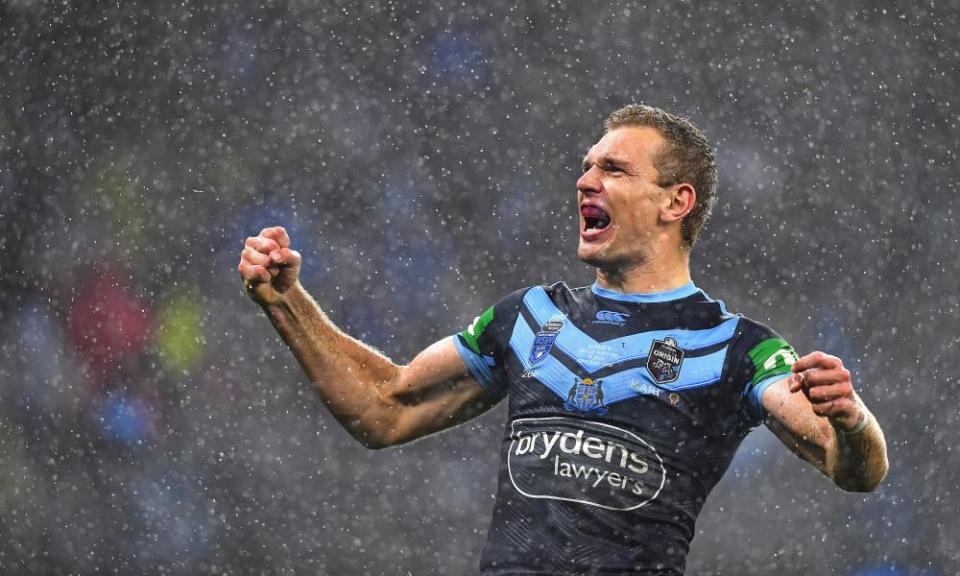How to stop State of Origin sucking oxygen from the NRL

Without the great Tom Trbojevic, Manly were zero-and-four, rudderless and hopeless. Since his return, the influence of this one-man force of nature has been likened to Andrew Johns’s at Newcastle Knights or Johnathan Thurston’s at North Queensland Cowboys. It’s almost as if when he plays, Manly win.
And yet, the big question is: do they play him on the wing for New South Wales?
Related: NRL floats idea of conference system in potentially huge shake up for rugby league
The Penrith Panthers are going great guns – one loss, the grand final, in the last 25 starts for this happy mob of local juniors, mates from Mt Druitt, who are playing a brand of fun-running footy that is lighting up the league.
The big question is, of course: does Jarome Luai partner Nathan Cleary in the halves for the Blues?
Latrell Mitchell was controversially ruled out through suspension which could put a dent in South Sydney’s top-four aspirations as they play without their star fullback for four weeks. Yet a major talking point is: does the time out give Mitchell time to be prove himself worthy of being picked at left centre for NSW in game one? On 9 June – a Wednesday six weeks away.
Brian To’o ran for a stupendous 337 metres for Penrith against Newcastle and reportage ponders whether he is NSW’s winger. Kurt Capewell has been outstanding in the backrow for the Panthers – but does he play in the centres for Queensland? The list goes on.
It’s like the NRL – the world’s premier rugby league competition – has become an audition for a three-game mid-year series. Origin may not be the killer whale that ate rugby league – but it certainly takes a good size chunk out of it and leaves it bleeding on the beach.
State of Origin not only sucks oxygen from the NRL competition, it degrades it by creating split rounds in which 34 of the game’s star players don’t play. It’s like watching Happy Days with stand-ins for The Fonz and Ralph Malph while the actor who plays Fonzie (Henry Winkler) is preparing for a more important role, something in Star Wars, say, or The Godfather. And not only that, when Winkler returns from playing Boba Fett or Vito Corleone, he returns as a lesser actor.
So physically and mentally draining is Origin that the players return beaten up. And the more successful the NRL club, the more of their best employees will be beaten up. Clubs accept it, though, because everyone gets paid. But is there any equivalent in world sport? Does Champions League worsen the Premier League or Serie A? Would the NFL or NBA play second fiddle to All Star games? Australian rules football hasn’t had an Origin series since 1999 because the AFL became national and the club competition assumed primacy – for players, fans and TV.
The NRL, meanwhile, to paraphrase long-time league journalist Steve Mascord in his book Touchstones, “humiliates itself by touching its toes in the prison shower of sports for seven weeks every year”. Mascord, a purist and self-described “league trainspotter”, decries State of Origin as a “a crass, unedifying sell-out”.
I think that’s a tad harsh. I think Origin is awesome. There is history, weight, context, hubris and characters. There is story in State of Origin. And while it is arguably not the “best” rugby league given the lack of England and New Zealand stars, it is super-popular in terms of prime-time TV. Come the Wednesday or Sunday night, it’s one of those games you just have to watch. It is event television.
But it does rather stuff up the NRL.
What to do? The global pandemic has shown us opportunity in crisis. And Origin, as it was last year, should be played at the end of the season. Not completely like last year, because that was rushed and jammed together in consecutive weeks. It felt like an add-on, an addendum.
But next year the suits could do this: kick-off the NRL season a week earlier on Thursday 10 March and play the grand final on Sunday 18 September. After the decider (or maybe at half-time) announce the Origin teams. Then play the first game two weeks later on the Sunday of the October long weekend, with game two on 16 October and game three on 30 October.
It would mean that, in that funny sort of twilight zone for sport in Australia, after footy and before cricket, you’d have rugby league’s “pinnacle” series complemented by Spring Carnival horse racing and V8s at Bathurst. Origin would own October.
After that they could pick the Australia side to play Tests against New Zealand, Tonga and/or England, and use the interstate series to decide the national team. Novel, no?

 Yahoo Sport
Yahoo Sport 





































